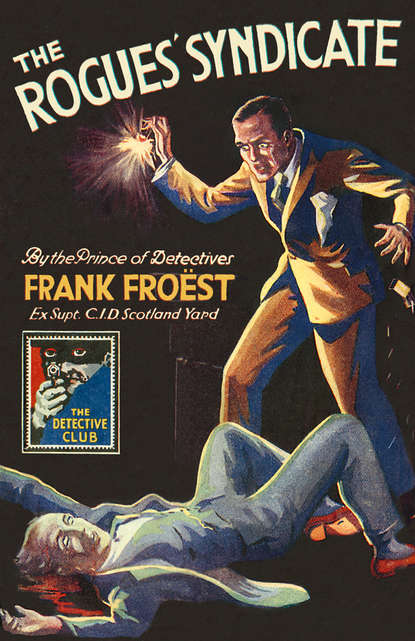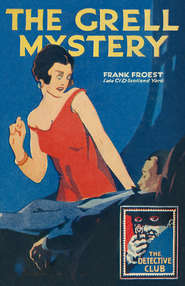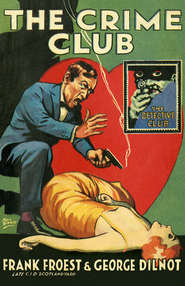По всем вопросам обращайтесь на: info@litportal.ru
(©) 2003-2024.
✖
The Rogues’ Syndicate: The Maelstrom
Автор
Год написания книги
2019
Настройки чтения
Размер шрифта
Высота строк
Поля
‘Think you can find a post-office, sonny?’ he demanded.
‘Take you anywhere, sir,’ assented the driver, cheerfully.
‘Find your way by the stars, I suppose,’ commented Hallett, the tingle of fog still in his eyes.
Nevertheless, the driver justified his boast, and his fare was shortly engrossed with the letter ‘G’ in the London Directory. There was only one entry of the name he sought, and he swiftly transcribed the address to a telegraph form.
‘Greye-Stratton, James Edward, 34, Linstone Terrace Gardens, Kensington, W.’
Shortly the cab was again crawling through the fog, sounding its siren like a liner in mid-channel. All that the passenger could make out was a hazy world, dotted with faint yellow specks, which now and again transformed themselves into lights as they drew near them. Later the yellow specks grew less as they swerved off the main road, and a moment later the car came to a halt.
The driver indicated the house opposite which they were standing, with a jerk of his thumb, as Hallett descended.
‘That’s the place, sir.’
It was little that Hallett could see of the house, save that it was a big, old-fashioned building, with heavy bow, windows and a basement protected by wrought-iron rails. There was no light in any part of the house, not even the hall. Twice the young man wielded the big, brass knocker, arousing nothing apparently but an echo. As he raised it a third time the door was thrown open with disconcerting suddenness, and he was aware of someone standing within the blackness of the hall. Hallett could distinguish nothing of his features.
‘I wish to see Mr Greye-Stratton,’ said Hallett, and tendered a card.
The other made no attempt to take it.
‘He won’t see you,’ he declared, with harsh abruptness, and only a sudden movement of Hallett’s foot prevented the door being slammed in his face.
His teeth gritted together, and he thrust the door back and himself over the lintel. He was an easy-tempered man, but the deliberate discourtesy had roused him to a cold anger.
‘That will do, my man,’ he said, clipping off each word sharply. ‘I want ordinary civility, and I’m going to see that I get it. My name is Hallett—James Hallett, of New York. Now you go and tell your master that I want to see him about certain property of his that has come into my hands. Quick’s the word!’
There was a pause. When the man in the hall spoke again his tone had changed.
‘I beg your pardon, Mr Hallett. It is dark—I mistook you for someone else. I am sure Mr Greye-Stratton would have been happy to see you, but unfortunately he is ill. If you will leave whatever you have, I will see that it reaches him. By the way, I am not a servant. I am a doctor. Gore is my name.’
Hallett thrust his hand in the pocket that contained the cheques. He had no intention of handing them over without some information about the girl in black. And he fancied he detected a note of anxiety in the doctor’s voice, as though, while forced in a way to civility, he was anxious for the visitor to go.
‘I quite understand, Dr Gore,’ he said, coldly. ‘I will call at some other time. I should like to return the property to its owner in person—for a special reason. Good-night!’
‘Then you will not entrust whatever you have to me?’
‘I would rather see Mr Greye-Stratton at some future time.’
He half turned to go.
‘One moment.’ The doctor laid a detaining hand upon his sleeve. ‘I did not wish to disturb my patient unnecessarily, but if you insist, I will arrange for you to see him. Will you come with me? I am afraid it is rather dark. The electric light has gone wrong—frightfully awkward!’
Hallett groped his way after his guide, his brain busy. It was queer that the light should have given out—queerer still that no apparent attempt had been made at illumination, either with oil or candles. The place was deadly quiet, but that was only natural with a sick man in the house. He wondered why some servant had not answered the door. A man of less hardened temperament would have felt nervous.
The doctor’s footsteps, falling with ghostly softness on the carpet in front of him, ceased.
‘Here we are, Mr Hallett. Keep to your left. This is the room. If you will wait here a second, I will see if I can get a light. Where are you? Give me your hand.’
Slim, delicate fingers gripped Hallett’s hand as he followed the direction. He passed through a doorway, and for a moment his back was turned towards the doctor. He heard something whirl in the air, and a blow descended with crushing force on his right shoulder. He wheeled with a cry, but there was no question of resistance. A second blow fell, this time better directed, and a million stars danced before his eyes. He dropped, stunned.
CHAPTER II (#u2fd2121e-089e-54e3-ac29-908e751c2890)
PUNCTUALLY at half-past six the little plated alarm clock exploded, and Weir Menzies kicked off the blankets. Punctually at seven o’clock he had breakfast. Punctually at half-past seven he delved and weeded in the square patch of ground that was the envy and despair of Magersfontein Road, Tooting. Punctually at twenty past eight he left his semi-detached house, and boarded a car for Westminster Bridge.
There were occasions when the routine was upset, but it will be observed that, on the whole, Weir Menzies was a creature of habit. He had all that respect for order and method that has made Upper Tooting what it is. From the heavy, gold watch-chain that spanned his ample waist to his rubicund face and heavy, black moustache he wore Tooting respectability all over him. It was a cause of poignant regret to him that circumstances prevented him from taking any part in the local government of the borough. Nevertheless, he belonged to the local Constitutional Club, and was the highly esteemed people’s warden at the church of All Saints. The acute observer, knowing all this, might have judged him as a deserving, wholesale ironmonger.
And the acute observer would have been wrong.
Punctually at half-past nine Weir Menzies would pass up a flight of narrow, stone stairs at the back of New Scotland Yard into the chief-inspector’s room of the Criminal Investigation Department. From his buttonhole he would take the choice blossom—gathered that day at Magersfontein Road, Tooting—place it carefully in a freshly-filled vase, exchange his well-brushed morning-coat for a jacket of alpaca, place paper protectors on his cuffs, and settle down on his high stool—he preferred a high stool—to half an hour’s correspondence.
Mr Weir Menzies, churchwarden of Upper Tooting, was, in fact, Chief Detective-Inspector Menzies of the Criminal Investigation Department, New Scotland Yard. Not that he made any secret of it. There was no reason why he should. It is only on rare occasions that a detective needs to conceal his profession.
Although the residents of Magersfontein Road, Upper Tooting, knew that Mr Weir Menzies, of Magersfontein Road, Upper Tooting, was an admirable churchwarden, they had to take his reputation as a detective on trust. And, being constant subscribers to circulating libraries, they knew him as an innocent fraud. A man something over forty, with an increasing waist-line and a ruddy face, was obviously against the rules of all the established authorities. It was only understandable because he was at Scotland Yard. Everyone knows that official detectives are heavy, dull, unimaginative fellows, always out of their depths, and continually receiving the good-natured assistance of amateurs, by whom they are held in tolerant contempt.
Magersfontein Road, Upper Tooting, would have smiled broadly had anyone remarked that Chief Detective-Inspector Menzies held an international reputation; that he was held one of the subtlest brains in the service; that he was a man who had time and again shown reckless courage and audacity in bringing off a coup; that he, in short, had individuality and a perfect knowledge of every resource at his disposal in carrying out any purpose to which he was assigned.
He looked a commonplace business man; he was a commonplace business man with many of the traits of his class. He hated the unexpected, and protested that he loathed with a fierce abomination those cases in which he was engaged that meant a departure from the ordinary routine. But yet in those cases when they arose, there was no man more capable of dealing with their subtle intricacies than he. He had the faculty of adjusting himself to an emergency, of ruthlessly destroying superfluous red-tape that, in twenty-three years, had carried him to within one rung of the top of the ladder.
It was shortly before midnight. He had returned from a remote suburb, where, with a corps of assistants, he had made a neat, entirely successful raid upon certain pickpockets who had been too well acquainted with the resident detectives to give them any chance. It had been a triumph of organisation and vigilance, and Menzies had gone back to headquarters to arrange that the histories of the birds he had caged should be ready before the police-court proceedings in the morning. He was struggling into his overcoat, when he was summoned to the telephone. He picked up the receiver irritably.
‘Hallo!’ he said.
A musical buzz answered him, and Menzies allowed himself an expression that should be foreign to a churchwarden. Then, far away and faint, he caught a voice.
‘That Mr Menzies?’
‘Yes,’ he answered impatiently. ‘Speak up! Who is it? What do you want?’
A prolonged buzz reached him. He was conscious of someone speaking, but only intermittently could he hear what was said.
‘Pretty done up—buz-z—come at once—buz-z—at thirtyfour—buz-z—Gardens, Kensington—buz-z.’
‘Number, please?’ said a new and distinct voice.
‘Blast!’ said Menzies simply, and put down the telephone.
This addiction to forcible language on occasions of annoyance was a constant regret to him in his more reflective moments.
Jimmy Hallett’s first impression on awakening had been that someone was swinging a sledge-hammer irregularly on to his temple. He lay still for a little, wondering why it should be. By-and-by he sat up, and tried to piece together the events of the evening. His head ached intolerably, and he found consecutive thought painful.
It was totally dark, and he could make out nothing of where he was. Then the whole thing flashed across his mind, and he staggered rather uncertainly to his feet, and, steadying himself against the wall, struck a match.
The feeble flicker showed him a blue-papered apartment, furnished as a dining-room. He had been lying just within the room, and now he tried the door. It refused to answer to his tug, and he realised how weak he was as he all but toppled backwards. The match went out, and he struck another.
Then it was that he noticed an electric-switch, and pulled it over. A blaze of light flooded the room, and he tottered to one of the Jacobean armchairs at the head of the table. The sledge-hammer was still swinging at his temples, and things swayed dizzily to and fro before his eyes. He made a resolute effort to pull himself together. His eyes roved over the room, and he noticed a pedestal telephone on a small table in the corner furthest from him.
‘What was the name of the chap Pinkerton gave me an introduction to?’ he muttered.







